Thread: 1937 Plymouth 5 Window Coupe
-
03-11-2016 09:49 AM #1
1937 Plymouth 5 Window Coupe
Hello All-
Started on a new adventure this winter. I decided to build a 1937 Plymouth 5 Window Coupe. Here is what I brought home.
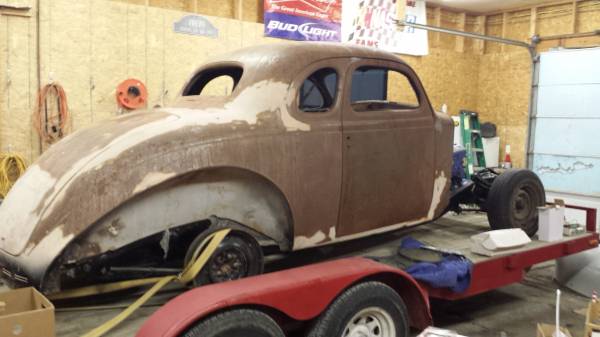
The first thing I did was to start researching and come up with a plan. This car already had some work completed on it. So I am following a little bit of their lead.
.Last edited by mprevo; 10-13-2017 at 12:28 PM.
-
Advertising

- Google Adsense
- REGISTERED USERS DO NOT SEE THIS AD
-
03-11-2016 12:43 PM #2
Anyways the story behind this build was this car was a sitting in a barn for almost 50 years before it was found. Two older hot rod guys from Minnesota found this car and started the build. They started on the sheet metal work. They frenched in the tail lights and did most of the patching. They also put an older Mustang II front suspension which I plan on rebuilding. They installed a Camaro 305 (boat anchor) engine, tranny, and rear end. From what I hear one of the gentlemen then got sick and passed away causing this build to go back into the barn and forgotten about again for ten more years. It was then found by a guy in Cheboygan and brought back to Michigan and put into a shed with a dirt floor.
This is where I came in.
I had just completed a frame off restoration/build on a 1985 CJ7. Even though I the Jeep turned out beautiful and my wife thought I was nuts I wasn’t really happy. I really wanted a Hot Rod and only ended with the Jeep because I found a guy on Craigslist who would trade me the starter Jeep for my snowmobile. Anyways I completed the Jeep in the spring and got rid of it in the fall for this 37 coupe.
I am much happier now if you are wondering.It is easy to make a small fortune in Hot Rods. Just start with a large one.......
-
03-11-2016 12:46 PM #3
OK back to the Plymouth and my plan. My plan for this build is more or less a RestroMod type of build. I am going to keep the SBC powertrain, but I am up grading the engine to a 383 stroker. The tranny will be a 700r4 with a set of 4:11 gears in the rear end. The Mustang II front end will be totally rebuild, so my plan is to have a car the will drive and handle very well down the road. I am still a little fuzzy on the exact plan for the body and color but I am working out the details daily whenever I get a few spare minutes. I have found a few pictures of cars I like so I am kind of modeling my build after those.
One item I am having a hard time with is deciding on the wheel and tire size. I guess I am going to have to do some assembly work to see what size tire will actually fit under the fenders. If anybody has any experience on wheel sizes for a 37 Plymouth Coupe I would love to hear your thoughts. I would also love to find someone who sells an over sized rear fender for this car that would allow me to install a wider rear wheel. I don't really want to get into trying to put in a mini tub (although that would be outstanding).It is easy to make a small fortune in Hot Rods. Just start with a large one.......
-
03-11-2016 12:57 PM #4
Once the Plymouth was home my first project, once the shop was cleaned up, was to build a rotisserie for the coupe. I went to the web and did some research. I found a few pictures of ones I liked. I then ordered up some steel and started hunting down the rest of the parts. After a weekend of work welding and painting the rotisserie was completed and I had the body mounted to it.
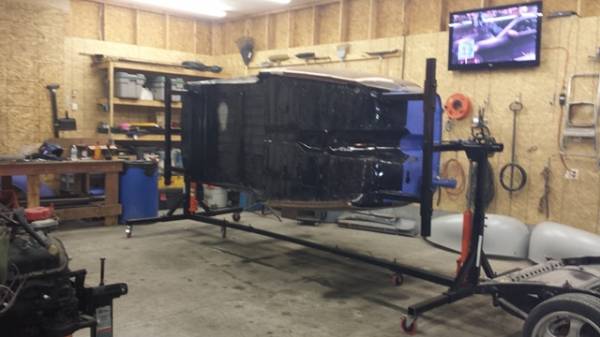
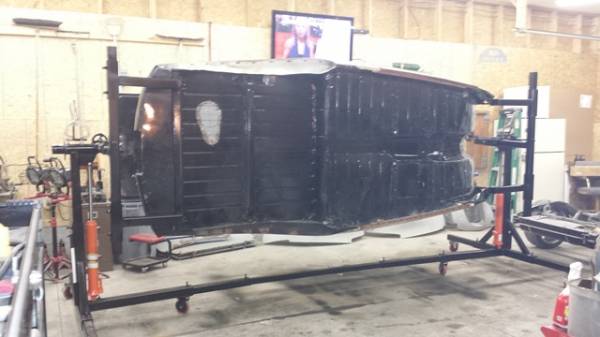
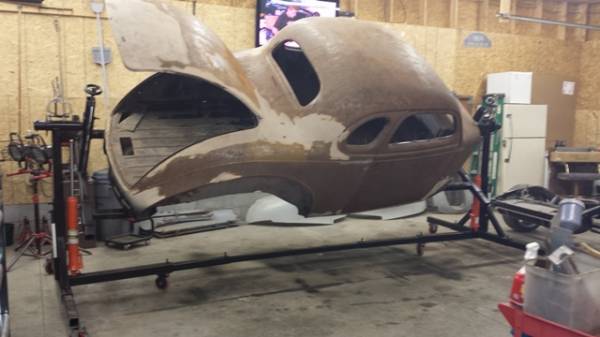
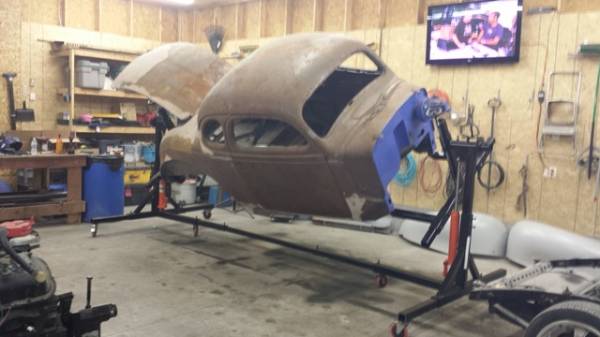
I really think this is going to be so helpful for this project because I won’t have to spend so much time on my back and knees on the concrete floor.
.Last edited by mprevo; 10-13-2017 at 12:33 PM.
It is easy to make a small fortune in Hot Rods. Just start with a large one.......
-
03-11-2016 05:40 PM #5
Congrats on the new project! Looks like a great starting point.
My only comment at this early stage is don't settle on that rear axle ratio until you have settled on the tire size. If you end up with a short tire and that rear ratio, you'll be turning a lot of rpm. Ok on the dragstrip or stop light racin' but awful for a long ride.
-
03-11-2016 07:12 PM #6
Lots of fellows make the mistake of using a an overdrive trans with a race cam.....won't work.
.PLANET EARTH, INSANE ASYLUM FOR THE UNIVERSE.
-
03-12-2016 03:57 AM #7
It is easy to make a small fortune in Hot Rods. Just start with a large one.......
-
03-12-2016 04:09 AM #8
I have already purchased most of the parts for the engine. The cam I selected is a little aggressive but my tranny builder says it will be OK. My friend (and builder) owns a transmission shop and is probably the best mechanic & builder I know. In fact he also teaches these subjects at our local college. He is going to go through this 700r4 from top to bottom with me. He is the one that told me this is the tranny I need for the usage I am planning. He says he can build it "bullet proof" for me. Only time will tell though. Why do you say it won't work? I always say that I'm never to old something new from the experts, so I would be intested in your thoughts.It is easy to make a small fortune in Hot Rods. Just start with a large one.......
-
03-12-2016 04:22 AM #9
What Tech said is in reference to a RACE cam that guys want to use on the STREET.. 2 different worlds. Sounds like you have a valuable resource helping you. Keep us posted and don't hesitate to ask questions.. of course, pics are almost madatory!






-
03-12-2016 04:56 AM #10
Tech can likely say it better, but your rear tire circumference, rear gear ratio and desired highway cruise speed will define a narrow band of rpm that you'll be looking for good economy and enough torque to keep from having to "get into it" for minor changes, like rolling hills, passing, etc. Your cam will have an rpm range for best power and economy, and a torque curve that tells you the flexibility of the engine speed. An "aggressive" cam is generally "happy" 3500rpm and up, while your OD tranny is going to be cruising at a much lower rpm which can make for a very frustrating hot rod. Your cam is probably the most important decision you'll make for a happy driving experience, followed closely by the balance of tire size (for looks and operation), rear gears and tranny OD ratio. Just my $0.02.Roger
Enjoy the little things in life, and you may look back one day and realize that they were really the BIG things.
-
03-12-2016 12:09 PM #11
Thanks Roger, I probably should have explained it better. Any cam you screw into the motor will have a certain cruise rpm range, where the cam will be effective. RPM's under that, due to using an overdrive transmission, will be disappointing in both acceleration and steady-speed fuel mileage. You don't have to take my word for it, here it is in black and white from the Crane Cams engineers.....read the left column to see what cam has what recommended cruise rpm range and also the static compression ratio that is recommended for that cam to work correctly. You cannot choose a cam for a motor until you have nailed down the exact static compression ratio. That's why I always recommend buying the cam next to last and the torque converter last. Been there, done that, many, many times. I guess it's just human nature though, fellows will run right out as soon as they unload the newest hulk off the trailer and buy a cam for it, without knowing any of the parameters that need to be in place to make an intelligent choice.
http://www.cranecams.com/56-67.pdf
Here's a for-instance.....
700R4 4th gear ratio 0.7:1
Ring + pinion ratio 4.11:1
Tire diameter 27"
RPM at 60 mph 2148
Looking at the Crane application list, a cam with something around 204 intake degrees @0.050" tappet lift would be a nice match, while moving up to 206 intake degrees would be outside the window. Of course, if you wanted to cruise at a higher speed, then you could use a cam with more intake duration. For instance, moving the cruise speed up to 70 mph (2506 engine rpm) would allow you to use a cam with 210 degrees intake duration @0.050" tappet lift. The exhaust doesn't matter so much, it's the intake closing point that matters.
I know this cam timing/gear relationship is totally shocking news to some fellows and I've been told on other forums that I don't know what I'm talking about (that's what most fellows say to me when I catch them on something that won't work and they're embarrassed over it, particularly if they've already bought the parts), but all it is is simple math. Do yourself a favor an read down through the rest of the Crane offerings, noting the cruise rpm's and suggested static compression ratios.
.Last edited by techinspector1; 03-12-2016 at 11:41 PM.
PLANET EARTH, INSANE ASYLUM FOR THE UNIVERSE.
-
03-12-2016 12:56 PM #12
Well the excitement of building the engine finally got the better of me and I had to start. My plan is to build a 383 stroker. I talked to a lot of people and did a lot a research. Once that was complete I ordered up the parts. Here is what I came up with for my engine build.
Block:
• Summit Racing Block
• Part #SUM-150100-30
• 1996-2000 GM Block
• 4 bolt main
• .030 overbore
• Lined honed mains
• Lined bored cam
• Clearanced/Machined for 3.75” stroke
• Machined deck surface
Crank:
• Scat 9000 Series
• Balanced
• Cast Steel
• One piece RMS
• 350 Mains
• Polished Crank
• 3.75” stroke
Rods:
• Scat Pro-Competition Rods
• 6” Rod Length
• Forged 4340 Alloy
• ARP 8740, 7/16” Cap Screws
• Rod to cam clearancing and sizing
Pistons:
• Wiseco Pistons
• Fully forged
• 4.030 (.030 over)
• -10 cc Dish Top
• D-Cup
• 1.140 Compression Height
• Forged 2618 Aircraft Alloy
• Hastings 2M High Performance, Moly, Standard tension rings
Bearings, Damper, and Flexplate:
• Clevite bearings
• Balanced on CWT balancer
• Pro-Race 6.75” Damper
• Heavy Duty flex plate
Cam:
• Howards Cam
• Part #180345-10
• Hydraulic Roller
• Valve lift = Int. 565/Ext .580
• Duration @ 0.050" = Int. .245/Ext .253
• Lobe Separation = 110 Deg
Heads:
• NKB Ultra High Flow Aluminum Heads
• Part #NKB-200-274
• 200 cc Runners
• 64 cc Combustion Chambers
• 2.02/1.60 Stainless Steel Valves
• Melling 1.46 diameter dual roller springs
• Howards 7.250” Pushrods, 4130 Chromoly, .080 wall thickness, 5/16” diameter
• Straight Plug
• ARP 7/16” Rocker Studs
• Dart Guide Plates
• Extreme Duty Gold Series Stud Girdles and 7/16” Poly Locks
• ARP Head Bolts
• Multi layered graphite/steel, .030 thick head gasket
Rockers:
• COMP Cams
• 17005-16 High Energy
• 7/16" Stud Diameter
• Die Cast Aluminum Roller Rocker Arm
• 1.6 Ratio
Timing Chain:
• Cloyes Hex-A-Just Timing Set
• Part #220-9-3145A-10
Intake:
• Edelbrock 7501 Performer Air-Gap Intake
• Aluminum
• Dual Plane
Carb:
• Quick Fuel SS-750 Carburetor
• Super Street,
• 750 cfm
• 4-Barrel
• Electric Choke,
• Mechanical Secondary
• Double Pumper
• 4.5 Power Valve.
I am in the process of building this engine now in my shop. I hope to have it complete in the next week or two. This engine build is supposed to produce around 510 horsepower at 6200 RPM with 10.5 to 1 compression on pump gas. Of course this is only on paper so the real answer is yet to be determined. Either way this should be lots of power for the old Plymouth. Of course one can never have too much power right……
On a side note I now have a tune port injected 305 SBC (that I know nothing about) sitting in the garage if anybody needs one.
Here are a few pics of the progress.
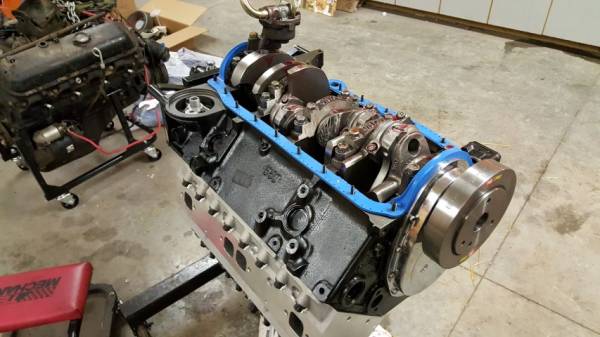
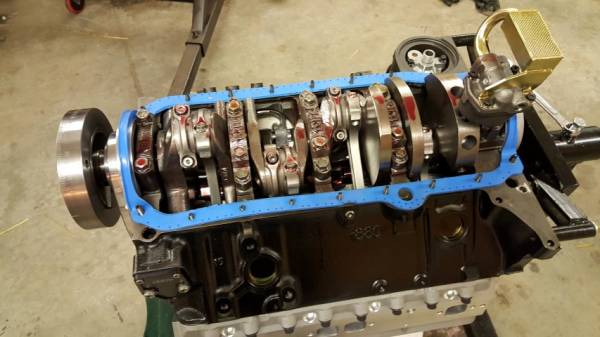
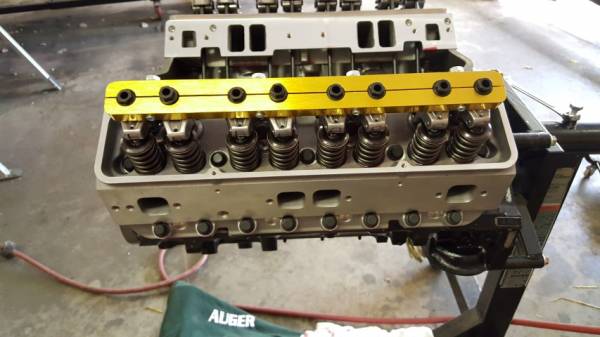
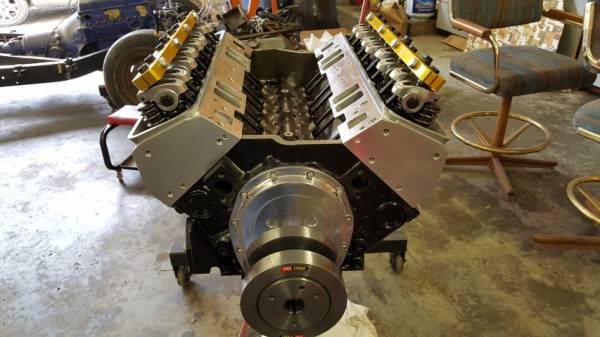
.Last edited by mprevo; 10-13-2017 at 12:39 PM.
It is easy to make a small fortune in Hot Rods. Just start with a large one.......
-
03-12-2016 01:02 PM #13
I have not purchased the converter yet so I will definitely have to look into it to make sure it is sized correctly. I also have not purchased the gars for the rear end yet so I still have that option open to me yet also. Lots of details to consider when building a hot rod. I'm sure that there will be many bumps along the road. Hopefully I can work through this cam one.It is easy to make a small fortune in Hot Rods. Just start with a large one.......
-
03-12-2016 01:11 PM #14
OK, your stack is 9.015". Now you need to know the block deck height so you can determine the head gasket to use in order to put your squish/quench at 0.030" to 0.032". If you can't find a readily available gasket, you'll need to cut the decks to +0.004" and use this gasket.....
http://www.summitracing.com/parts/na...make/chevrolet
Or cut them to -0.009" and use the Fel-Pro 1003. This is based on a static compression ratio of 10.5:1 to 12.0:1, which is what the cam will want.
With the piston at 0.004" down in the bore with the piston at top dead center and using the gasket shown above, your static compression ratio would be 10.68:1 and the squish/quench would be 0.032".
The cam you have chosen will want to cruise at somewhere between 3800 and 4600 rpm's. Sort of makes your 700R4 choice look a little silly, doesn't it?????
That cam will also want somewhere between 10.5:1 and 12.0:1 static compression ratio to work right. Good luck trying to run the motor on pump gas. The aluminum heads will help make it work, but you'll need a really tight squish/quench. I'd be engineering it down around 0.030" to 0.032" as I suggested above.
The aluminum heads will help make it work, but you'll need a really tight squish/quench. I'd be engineering it down around 0.030" to 0.032" as I suggested above.
.Last edited by techinspector1; 03-12-2016 at 01:48 PM.
PLANET EARTH, INSANE ASYLUM FOR THE UNIVERSE.
-
03-12-2016 01:21 PM #15
Since you have chosen a mechanical secondaries carb (in my opinion, a big mistake on a street motor), you will want to use a minimum 3000 stall 10 inch converter and I'd lean toward a 3500 10 inch because the cam won't begin making power until 3000 rpm's and you want a 500 rpm head start.
.Last edited by techinspector1; 03-12-2016 at 01:29 PM.
PLANET EARTH, INSANE ASYLUM FOR THE UNIVERSE.




 117Likes
117Likes

 LinkBack URL
LinkBack URL About LinkBacks
About LinkBacks Reply With Quote
Reply With Quote


Sorry for your loss of friend Mike McGee, Shine. Great trans men are few and far between, it seems. Sadly, Mike Frade was only 66 and had been talking about retirement for ten years that I know...
We Lost a Good One